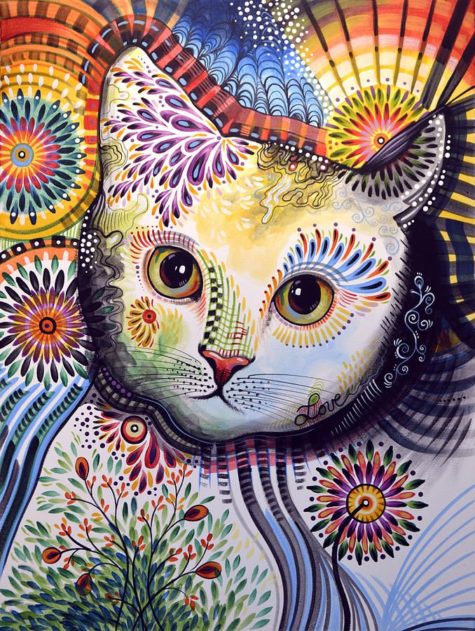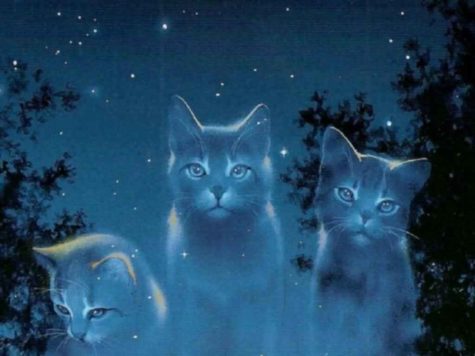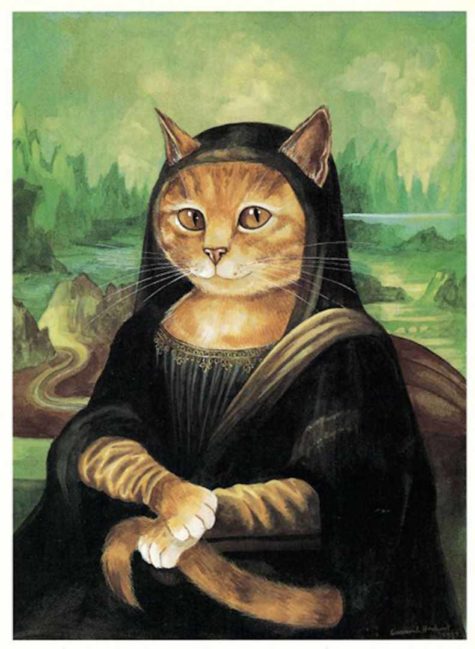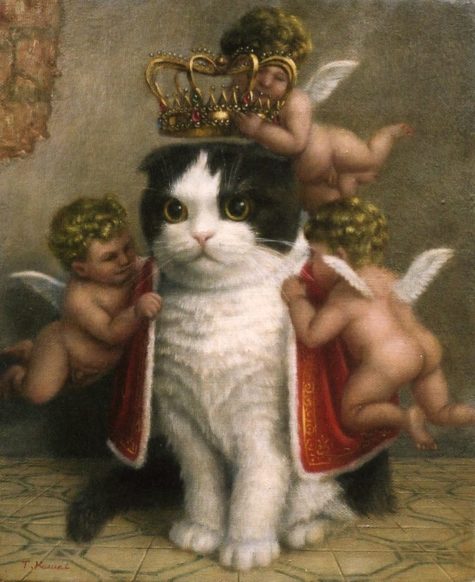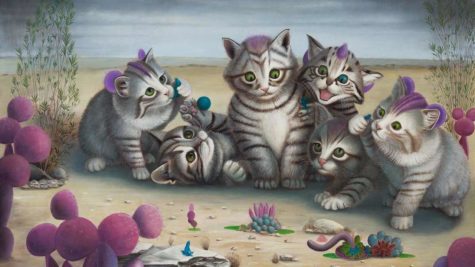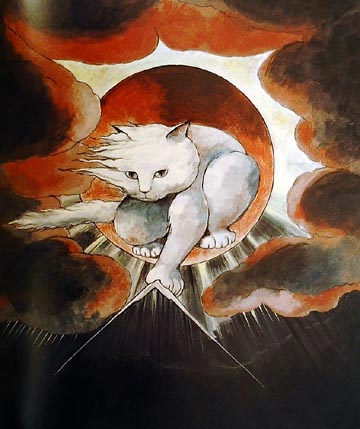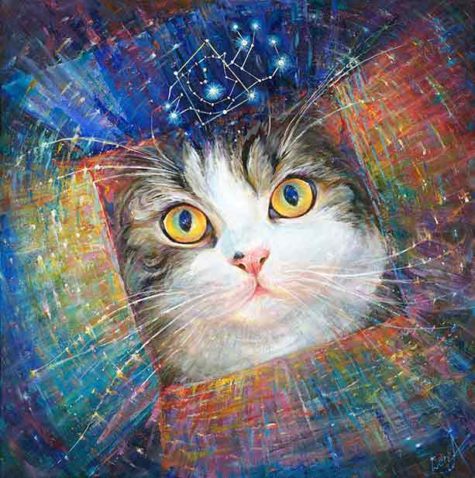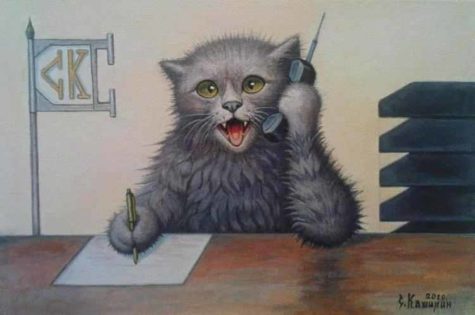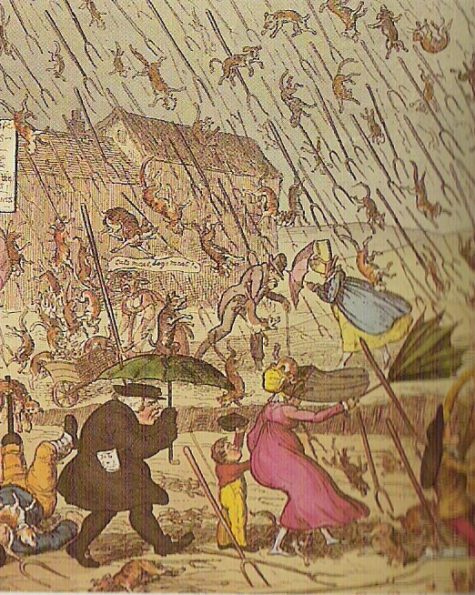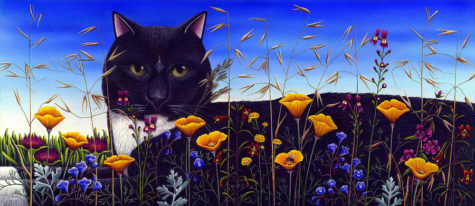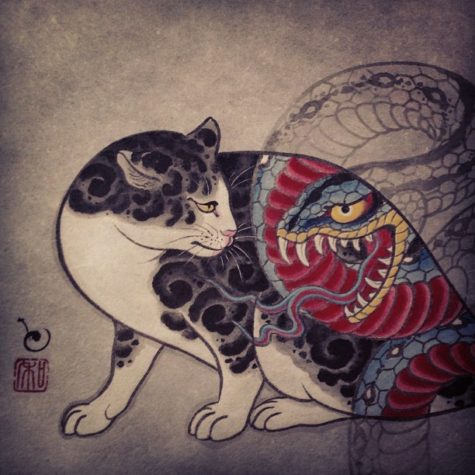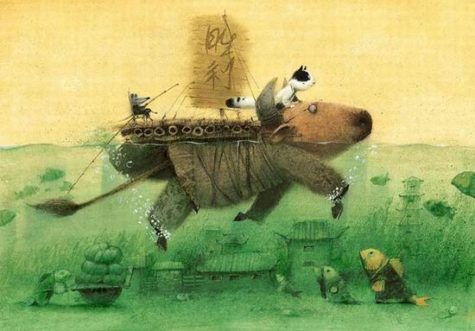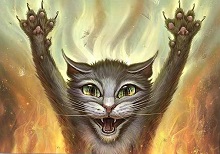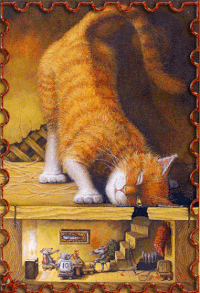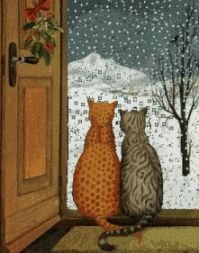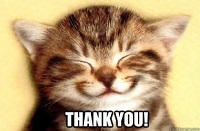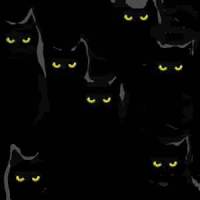Symbolism
Magickal Cat Names
There is an old tradition of naming that belongs to wisecraft, and in the following post a list of names for cats is offered, each of which is believed to create it’s own “naming spell” if it is used in conjunction with the magickal working given here: Spell for the Ancient Magickal Art of Naming.
The list is not comprehensive, but should serve rather as a starting point for your own ideas and research concerning the delicate question of naming your cat.
Each name is supposed to impart a distinctive and individual quality:
- Names of Distinction ~ lend dignity and encourage “seniority of soul”
- Folk Names ~ foster a cat’s “child spirit”
- Magickal Names ~ bring a certain energy, effect, or magickal influence
And so, according to wiselore, a subtle three fold influence will be exerted over your feline friend when naming is celebrated as a magickal act. Alternatively, these names and their various meanings may reveal your cat’s true name, and give a bit of insight into the true nature of your feline friend.
Do not hesitate to give your cat three names, for there is the inspiration of the Holy Trinity in it, and cats especially are animals of the Soul of All Things.
To name a cat three times whispers too of the uniform nature of the moon, for does not the night Goddess appear to us with either a full round face, or waxing with horns towards the east, or yet waning with horns towards the west? And in her pretty crescent or her majestic fullness, do we not see a likeness when we study the cat’s eye, for does not the contraction and dilation of its pupil speak to us of Bride and Artemis, goddesses of the new moon and the full? The cat is ever the creature of the night and goddess of the night.
Names of Distinction
To honor the dignity of your feline companion, and to bestow consequence.
Feminine Names of Distinction
- Adeline ~ Noble Serpent
For a queen who is shy, sensitive, easily offended, quiet and unobtrusive. - Agatha~ Goodly
For a queen who is primarily reserved and proud, over whose spirit move vivid flashes of brilliance, who in rare and intimate moments is lively and kittenish - Alberta ~ Nobly Bright
For a queen who is retiring, independent, graceful, who has a pensive, dreamy air as though she lived half in the spirit world, who distrusts men. - Angelica ~ Angelic
For a queen who loves the moon and whose behavior accurately foretells the weather, who must be stirring at night, who seems to see fairies, during the day she is languid and voluptuous, her affections run deep. - Aubrelia ~ Golden
For a queen who is haughty, flighty in her affections, beautiful in appearance, adores home comforts and luxury, she is disdainful of other cats. - Awne ~ Swan Maiden
For a queen with a sparkling, humorous air, as though she were ever laughing joyously at her human friend, her affections are sentimental, she has grace and beauty, she is an ever faithful companion to one member of the family, whom she herself selects. - Beatrice ~ Blesser
For a queen who is lively, bold, intelligent and gay, she is enterprising and determined, she often finds herself in trouble, but is cheerful and imaginative in her attempts to extricate herself from it. - Berenice ~ Bringer of Victory
For a queen who is full of vanity and selfishness, yet is the soul of constancy and who unconsciously brings much laughter and amusement to her human friend. - Bridget ~ Virgin Bride, Strength
For a queen who is peaceful, homely, domesticated and devoted, she cherishes motherhood and is fiercely protective of yer young, her owner has her heart above all else, however, from whom she will accept even abuse quietly and meekly. - Clementina ~ Merciful
For a queen who is a good mother, affectionate, loyal and placid, she is sleepy, but not indolent, she will catch prey, but only for food, she is attracted to water. - Columbine ~ Dove
For a queen who is timid, resourceful, hesitant and solitary, her trust can be enticed from her, and if you are worthy, it is yours for good. - Diana ~ Goddess
This queen is a strong, proud, vital animal, her passions and affections are deeply rooted, and will never fail, she is never fickle, but always valorous and bold, she may seem to have magickal powers and to be in communion with spirits, it is easy, and instructive to converse with the soul of this cat. - Elfrida ~ Elf Threatener
Solitary, proud, dignified, this queen prefers her own company, the human friend is sometimes graciously allowed to engage her affectionate attention, she is elegant, delicate, graceful, reserved, she needs to know you will before she will place her trust in you. - Ernestina ~ Eagle Stone
For a queen who is animated, coquettish, ardent in her affections, her air is one of vulnerability, surprise and timidity, she can show great courage, however in the face of danger, and suffers pain or injury with reticence and forbearance. - Griselda ~ Stone Battle Maid
This queen is resourceful and determined, she possesses an abundant, muscular beauty, she is fearless and graceful, her soul is remote and strong, but she is deeply faithful. - Petronella ~ Rock
For a queen who is jealous in her affections arrogant, restless and alert, she is intelligent, passionate and regal, she is a conscientious though excitable mother. - Rosamund ~ Rose of the World
For a queen who is spiritual, refined and delicate in her habits, pensive, dreamy, beautiful and proud of carriage, in her affections she is gentle, yielding and ardent. - Selene ~ Moon
For a queen who is secretive, drawn to the night, dark and mysterious in her aspect, majestic, gracious, condescending, she is serene and inert during the day, her habits are luxurious and extravagant. - Sibyl ~ Wise Woman
For a queen who seems to be possessed of an ancient, steadfast soul, sagacious, calm, refined, sweet natured, she prefers quiet seclusion in the company of her owner, to whom she is passionately devoted, although she has a strong, independent, resourceful personality. - Theodora ~ Divine Gift
For a queen who is sweet of temperament, graceful, wistful, she is intuitive emotional and timid, her human friend will often dream of her, her dream-likeness is wise and full of strange prophetic powers. - Virginia ~ Maidenly
For a queen who is serious, attentive, silent and graceful, she is unassuming, but can be tempestuous when aroused, she is generally timorous and of subtle, changing moods. - Zerah ~ Rising of Light
For a queen who is whimsical, seeming to dwell in a world of visions, she is intelligent, proud and austere, her personality is daring, captivating, she can be impetuous and intrepid.
Masculine Names of Distinction
- Alfred ~ Wise Elf in Council
For a tom who is prudent, keen, cunning and wise, he is strong and bold, solitary and pensive, he does not make enemies but is held in deep respect, even dogs flee him. - Ambrose ~ Immortal
For a tom who is affectionate, trustful, languid, voluptuous and extravagant in personality, he loves the night, seeks a mate, but avoids fights, he is a first rate hunter, but will kill only for food, he is deeply crestfallen and subdued if he loses his dignity. - Aubrey ~ Elf Ruler
For a tom who seeks the company of the moon and the night, he may be away for days, yet always returns faithfully home, with a sagacious air, as though his travels have imparted much experience and wisdom, if he has a feline companion, he will become deeply attached to his friend, his owner can be sure of his affection and loyalty. - Bertrand ~ Bright Raven
For a tom who is wise and noble in his bearing, whose eyes hold great depth, who seems to hold counsel with himself as though he could gaze steadily down the highways of time and garner wisdom from ages past, he will walk with you, and guide you to strange and lovely places where the fairies dwell, he is always gentle and affectionate and devoted to his owner, although he can be fearless when the need arises. - Caradoc ~ Beloved
For a tom who is bright, humorous and agile, he displays a sweet kittenish temperament although his human friend is not fooled, for this cat is wise and gifted, he can enter your dream as a guiding beneficent spirit, he is not afraid of losing his dignity, and seems often to seek to do so, as though he had some lesson to impart to his delighted observers. - Carmichael ~ Friend of Michael
For a tom who is erratic, noble, ubiquitous, he is agile and intelligent, his temperament is like quicksilver, full of surprises and quirks, he is affectionate, though reserved. - Dominic ~ Sunday’s Child
For a tom who is lovable, changeable, though unswerving in his loyalty to his owner, he distrusts men and adores women, almost as if he would pay court to them, he chooses certain stations in his environment which become his indisputable domain, for this principle to be challenged causes him the deepest consternation, and such effrontery will cause him to leave home for a period as a chastisement to his owner. Yet being loyal, he will always return, expecting to be petted and made much of. - Egbert ~ Formidably Bright
For a tom who is sensitive, intelligent, proud of his status among his fellows, he has no sense of humor, and mishaps and misjudgments cause him agonizing humiliation and embarrassment, if his owner is party to his fall from dignity, he will sulk for hours. Being a noble tom, he is delicate and honorable in his habits and behavior. - Jabez ~ Sorrow
For a tom who is gentle, affectionate, loyal and placid, his is a solitary soul, but he will never stray far from home, as though he were cognizant of life’s shadows, he is contemplative, meek and unobtrusive, nice in his habits. - Jerome ~ Holy Name
For a tom who is impulsive, rash, haughty, he loves to dice with death, especially when he has an audience, he loves the night and the moon, but is very companionable at home, his enemies fear him, he loves human companions of the feminine gender and generally will not allow caresses from men, he is honorable in battle, and will allow vanquished foes to escape without harm, he is very jealous and possessive with his human family. - Llewellyn ~ Lionlike
For a tom who is sleek, muscular, noble and upright of carriage, he is never furtive, he loves company, but is reserved and watchful therein, strangers make him shy, rare moments find him adoringly affectionate towards his human friend, he has ever a warm heart beating beneath a cool and poised exterior. - Marmaduke ~ Sea Leader
For a tom who is a traveler, an adventurer, who seems to wish to walk the wide world, he seeks many lady loves, for whom he would fight to the death, after many wanderings, he will come home to enjoy the peace and company of the domestic fire, fully expecting to be cosseted, fussed over, petted and fondled as if he were a warrior home from the battlefield. His owners generally meet his expectations, for they sense a spirit of expansiveness and nobility in him. - Otto ~ Rich
For a tom who is fond of capers and games, he is athletic, enthusiastic, innocent, valorous and cheerful, he will seldom allow his owner to be idle, demanding constant attention and active companionship, he likes to shadow his human friend, he will, by and by, settle and grow placid and redolent for a little while, he dreams vividly, and can step into the dreams of his human companion. - Randolph ~ Wolf of the House
For a tom who is exuberantly loyal, affectionate, sweet natured and sociable, he is noble, wise, strong, intelligent and physically majestic, has moments of gravity and contemplation, but is more often absurdly kittenish, lovable and playful. - Solomon ~ Peaceful
For a tom who is languorous, luxurious, proud, extravagant and delicate in his habits, he presents an air of aristocratic refinement, as though he were cultured and high-bred, he adores his human family, who alone can induce him to relax his dignity and become playful. - Theodoric ~ Ruler
For a tom who is passionate in his freedom and independence, who is individualistic, eccentric, phlegmatic, and wise, he has periods of domesticity, when he is abundantly and overtly affectionate.
Folk Names for Feline Child Spirits
- Billy Winker
For a tom who is winsome, mischievous, easily frightened, often foolish, he stalks prey assiduously, but will turn around and run when he gets too close to his quarry. - Kitty-Witch
For the queen who is pert, capricious, frolicsome, moody, she plays the coquette to gain human attention, frisks at weather changes and thunder, becomes irritable and demanding if she cannot remain the center of attention. - Melsh Dick
For a tom who is swift and silent as a sprite, always appearing unexpectedly or spying on his human friends from hidden peepholes, he is disobedient, cheerful and heedless, he causes many minor calamities, he loves the night, and he loves to be vocal in it. - Pegsy
For a queen who is timid, frisky and shy, she dislikes company and will flee at the sight of strangers, her owner will be able to win her trust only with great effort and patience, she needs to be steadied and brought down to earth. - Pisky
For a queen who is of shifting moods, she will assume a regal air, then wax kittenishly playful, she will sulk for an hour or two, fall asleep, and wake wide-eyed and innocent, forgetful of presumed insults. - Wiggin
For a tom who is playful, foolish and unable to acquire the usual feline skills, he cannot climb, unless it be to the window ledge, where he spends most of his time, he is prone to absurd mishaps and accidents which are seldom serious, he cannot hunt, but will run after butterflies. - Wilkie
For a tom who is phlegmatic, plodding, patient, he will insist on attempting what he knows he is incapable of and has often to be rescued from treetops and other heights, he will always flee from a fight, though other toms seek to waylay him. - Yarthkins
For a queen who is playful affectionate and kittenish all her life, although she kindles many kittens, these she hides with great mystery in odd places, presenting them afterwards to her human friend with a show of triumph and pride in her achievement.
Magickal Names for Magickal Cats
Magickal names for magickal cats can encompass a wide variety of energies and ideas. If you wish to bring a certain energy, effect, or magickal influence into your life through your magickal cat, you can use the power of a name to do so.
The Earth Element
In ancient Celtic symbolism, the Earth is a unifying force. The Earth consecrates. It anchors, reunites, and re-establishes all things in need of her balancing effect.
- Earthy Names
Alluvia, Arroyo, Beck, Bare, Cairn, Chalcedon, Clay, Crag, Crystal, Dolman, Dune, Gemma, Greenwood, Grove, Jet, Ley, Mesa, Moraine, Obsidian, Onyx, Ravine, Savanna, Shale, Stone, Sylvan, Sylvana, Tarn, Telluria, Topaz, Tor, Vale.
The Air Element
Carefree, light and fast, the element of Air speaks of our distant and transparent nature, and prepares us to jump into the wind and fly. The element of Air gives us room to breathe, widens our lungs, and with them, opens our Soul to personal freedom.
- Airy Names
Aether, Anemone, Argon, Boreas, Cardea, Gale, Hurikan, Keen, Khamseen, Mesembria, Miasma, Myst, Notus, Scirocco, Skye, Tempest, Typhon, Vortex, Windflower, Zephyr.
The Fire Element
The fire element is all about transformation. The Element of Fire has great power for forging will and determination. It is our inner light as well as a living symbol of the Divine fire that burns in every soul.
- Fiery Names
Agni, Ardent, Baelfire, Blaze, Candelifera, Censer, Chandelle, Dittany, Ember, Firefly, Flame, Glint, Gorge, Magma, Phoenix, Prometheus, Pyrrha, Salamander, Scorch, Smoke, Smolder, Sylph, Tallow, Taper, Torch, Vesta, Vulcan.
The Water Element
Water is a cleansing, healing, psychic, and loving element. It is the feeling of friendship and love that pours over us when we are with our family, friends and loved ones.
- Watery Names
Amberella, Amphora, Aquamarine, Avalanche, Brine, Brook, Cascade, Chalice, Delta, Deluge, Dylan, Hailstone, Hoarforst, Llyr, Maelstorm, Moonsoon, Niagra, Nile, Oasis, Oshun, Pearl, Rain, Riverine, Scald, Serac, Storm, Telechine, Tide, Torrent, Trill, Tsunami, Wave, Weir.
Names from the Deva Kingdom
- Any flower, herb, or tree can be used for magical names:
Agrimony, Aloe, Amaranth, Anise, Betony, Buckthorn, Chervil, Damiana, Elecampane, Gentian, Germander, Lovage, Mastic, Medlar, Melilot, Oleander, Pomergranate, Savin, Samphire, Tamarind, Tarragon, and Yarrow.
- Plants that are considered especially magickal:
Aconite, Belladonna, Blackthorn, Bryony, Galangal, Hellebore, Mandrake, Nightshade, Rowan, Vervain, or Wolfbane.
Names from Myth and Legend
- Male power names:
Anu, Cernunnos or Kernunnos, Shango, Cuchulain, Gilgamesh, Hercules, Marduk, Poseidon, Samson, Taranis and Thor.
- Female power names:
Ambika, Boadicea, Cartimandua, Dellah, Durga, Galiana, Kali, Macha, Mong Ruadh, Morrigan, Myrine, Nessa, Onomaris, Oya, Scathach and Vashti.
- Female Amazon Names:
Aella, Antandre, Antianira, Antiope, Clymene, Evandre, Harpe, Hippolyta, Lyce, Melanippe, Myrian, Omphale, Otrere, Pantariste, Penthesilea, Polydora, Thalestris, Thoe, Xanthe.
- Male Centaur Names:
Ancius, Argius, Centaurus, Chiron, Crotus, Dexamenus, Elatus, Eurytion, Hippotion, Hylaeus, Nessus, Oreus, Phrixus, Thereus.
- Satyr Names:
Astraeus, Gemon, Lamis, Leneus, Lycon, Napaeus, Orestes, Pan, Petraeus, Phareus, Pithos, Poemenius, Satry, Satyrion, Satyrius, Satyros, Silenus.
- Nymphs:
Abrya, Andrastea, Anthracia, Asteria, Asterodia, Chian, Chreyse, Crannae, Dryope, Echo, Harmonia, Leuce, Marica, Menthe, Moria, Mytoessa, Neda, Nephele, Orphne, Perdix, Phiale, Philyra, Phyllis, Pitys, Rhene, Thisbe.
- Male Fairies:
Aillen, Amadan, Dubn, Brown Man, Cluricaun, Credene, Donn, Gachan, Ginvarra, Ghillie, Kelpie, Luchtar, Melwas, Oberon, Puck, Rhys Dwfen, Tamerlane, Trow, Tylwyth, Urisk, Wichtlein.
- Female Fairies:
Aeval, Aine, Airmed, Aoibheal, Banshee, Bendith, Caer, Clethard, Cliodna, Donagh, Eri, Glaistig, Uaine, Grania, Mab, Summer, Titania, Una.
From: Catspells and other sources
Dreaming Cats
- To dream of a black cat is lucky.
- To dream of a tortoiseshell cat means luck in love.
- To dream of a ginger cat means luck in money and business.
- To dream of a white cat means luck in creativity, spiritual matters, divination and spellcraft.
- To dream of a black-and-white cat means luck with children; may also mean the birth of a child.
- To dream of a tabby cat means luck for the home and all who live there.
- To dream of a grey cat means to be guided by your dreams.
- To dream of a calico or multi-colored cat means luck with new friends and old ones.
- A dream of two cats fighting means illness or a quarrel.
More about cat dreaming can be found here: Dreaming About Cats
A Cat-alogue of Catty Words
The English word cat dates from before 900A.D. – comes from the Old English words: catt (male) and catte (female). The word comes from Old High-German / Old Norse words.
Here’s a collection of phrases and sayings, along with what they mean, and a little bit of history here and there:
- A bag of cats
A bad-tempered person such as: “She’s a real bag of cats this afternoon!”
- A cat in gloves catches no mice
Sometimes you can’t accomplish a goal by being careful and polite. An idiom attributed to Ben Franklin in Poor Richard’s Almanac
- All cats are gray in the dark
All persons are undistinguished until they have made a name. An English proverb.
- Alley cat
A stray or homeless cat. The “alley” portion probably refers to prostitutes, who at one point literally carried a mattress around with them. The “cat” probably alludes to the mating habits of female cats.
- Another breed of cat
Something different from anything else
- As much chance as a wax cat in hell
There is no chance at all.
- As nervous as a cat in a room full of rocking chairs
Someone with frayed nerves; jumpy. The allusion, of course, is to the fact that cats don’t like having their tails tromped upon. Where the phrase originated is unknown.
- Busier than a one-eyed cat watching two mouse holes
Very busy, almost to the point of being frantic.
- Busier than a three legged cat in a dry sand box
Very busy, almost to the point of being frantic
- Cat-and-dog
Resembling or having the character of the proverbial antagonism between cats and dogs.
- Cat around
To live an aimless, immoral life. (See tomcat and alley cat)
- Cat burglar
A nimble, silent, sneaky thief. Refers to the way cats are able to sneak up and steal their prey
- Catcalls
Booing bad acting. The expression goes back to the theater of Shakespeare’s time, when men criticized the acting by making noises that sounded like a fence full of cats.
- Caterwauling
Making harsh noises or cries. Probably came from Shakespeare’s play Twelfth Night: “What a caterwauling do you keep here!” (see also Cat’s cats / cat’s melody / cats in chorus)
- Cat-eyed or cat eyes
Able to see in the dark. Coined in recognition of a cat’s ability to see in very low-light conditions.
- Cat got your tongue?
Why aren’t you talking? The phrase probably comes from a custom in the Mideast hundreds of years ago, when it was common to punish a thief by cutting off their right hand, and a liar by ripping out their tongue. These severed body parts were given to the king’s pet cats as their daily food.
- Catgut
What tennis rackets and violin strings are made of. The word came about when the German word “kitgut” was translated into other languages. Kitgut was a small fiddle. The folk tale “cat and the fiddle” probably has something to do with the translation as well. Catgut was usually made from sheep or goat, or occasionally other animals like the horse, pig or donkey — never from a cat.
- Cat ice
Thin, dangerous ice. Ice that would not support a cat, similar to the phrase “skating on thin ice.”
- Cat-in-hell chance
No likelihood of success. It originally referred to the hopelessness of fighting with inadequate weapons. (The complete phrase is: “No more chance than a cat in hell without claws.”)
- Catkins
Fluffy flower bracts of willow and birch trees. The catkins look like small cats’ tails. (Other plants refer to cats also: pussy willow and cat tails.)
- Catlap
Usually weak tea or milk; something fit only for cats to drink.
- Catnap
Sleeping for a short period of time. Reference to the ability of a cat to sleep frequently and lightly
- Cat o’nine tails
A whip. In olden days, people were flogged by a nasty device made up of three separate knottings of three stands attached to the whip’s handle. While the strands may have been made from the hide of cats, the multiple of 9 had already been associated with cats; presumably if a person being flogged survived, they were as lucky as a cat with 9 lives.
- Cat’s cradle
A string game played by children. In early Europe, people believed a cat could increase the chances of fertility in a young married couple. A month after the wedding, a fertility rite was performed, where a cat was secured in a cradle, and the cradle was then carried into the newlyweds’ house and was then rocked back and forth. This ensured an early pregnancy. The string game creates what looks loosely like a cradle, and over time it was called a ‘cat’s cradle.’
- Cat’s eye
Precious or semi-precious gems that have a changing luster; also road markers which reflect car lights (invented by Englishman Percy Shaw). Refers to the coloring similar to a cat’s and to the reflecting of light in a cat’s eyes.
- Cat’s foot
To live under the cat’s foot is to allow someone to control you. Phrase was coined in reference to the behavior of a cat with a mouse or other “toy.”
- Cat’s concert / cats in chorus / cat’s melody
Making harsh noises or cries. Probably came from Shakespeare’s play Twelfth Night: “What a caterwauling do you keep here!” (see also Caterwauling)
- Cat’s meow
Something considered to be outstanding. Coined by American cartoonist Thomas a. Dorgan (1877-1929) whose work appears in many American newspapers. (see also Cat’s whiskers)
- Cat’s pajamas
Something considered to be outstanding. The term “cat’s pajamas” comes from E.B. Katz, an English tailor of the late 1700’s and early 1800’s, who made the finest silk pajamas for royalty and other wealth patrons. Nothing like a cat nap in Kat’z pjs. (from the book, “Cats out of the Bag” compiled by Terry, Don and Ken Beck)
Alternative: A slang phrase coined by Thomas A. Dorgan in the 1920s when the word “cat” was used as a term to describe the unconventional flappers from the jazz era. This was combined with the word pyjamas (a relatively new fashion in the 1920s) to form a phrase used to describe something that is the best at what it does, thus making it highly sought and desirable.
- Cat’s paw
To be labeled a “cat’s paw” means someone has taken advantage of you and you weren’t smart enough to “cat”ch on.
Also (for sailors): Cat’s paw means a brisk, skittish breeze that might catch you unawares ~ the way a playful cat might paw you. The phrase has its origins in an old folk tale in which a clever monkey tricks a cat into reaching into a fireplace to pull out some roasting chestnuts. The monkey got the chestnuts, but the cat got burned.
- Cat’s whisker
Before diodes were invented, people made a kind of diode by touching a long thin wire against a germanium crystal. This was enough to rectify a radio signal to the point where it could drive a single earpiece. The radio was a “crystal set” and the long wire was the “cat’s whisker”. Presumably, the wire was nicknamed as such because it looked similar to cats’ whiskers.
- Cat’s whiskers
Something considered to be outstanding. Coined by American cartoonist Thomas a. Dorgan (1877-1929) whose work appears in many American newspapers. (see also Cat’s meow)
- Catty remarks
Comments made by a woman, usually about another woman. The phrase came about when a man named Heywood, in the middle 1500’s wrote “A woman hath nine lives like a cat.” Soon, a woman who gossiped about other women was said to be making “catty” remarks about them.
- Catwalk
A narrow walkway. Termed as such because of a cat’s ability to balance in very narrow places.
- Clowder of cats
A group of cats. There is a 15th century reference to clouder and later crowder in the book of St Alban. It meant a variety of things but mainly a crowd, or cluster, clotting, coagulating. It appears to be a word which predates the Mayflower pilgrims who sailed from Plymouth by a couple of hundred years.
- Cool cat
Someone who keeps up with the latest trends. The term came about in the Roaring 20’s, and ita meaning hasn’t changed. (see also Hep cat)
- Conceited as a barber’s cat
Very conceited
- Copycat
A person who copies others. Probably a reference to the way kittens learn by copying their mother’s actions.
- Couldn’t cuss a cat without getting fur in your mouth
Referring to tight, cramped spaces
- Curiosity killed the cat
Be cautious when investigating situations. The saying originally was “care kills a cat,” and began in the 16th century. “Care” was a warning that worry is bad for your health and can lead to an early grave; the phrase was a recognition that cats seem to be very cautious and careful. Over time, the word “care” evolved into “curiosity.”
- Dead cat bounce
An automatic recovery in a financial market. Refers to the lore that a cat ‘bounces back’ from death many times.
- Dead cat on the line
Something suspicious or ‘fishy’ is going on. Refers to fishing for catfish. The lines are checked every day, so if there’s a dead catfish on the line, there’s something wrong.
An alternative definition: Science Magazine, about the early 1980’s had and article about colloquialisms and the like. The term Dead cat on the line is an expression from the mid 70s and earlier when many folk had party lines still for their telephone service. If someone was listening in you would hear a click. The way one speaker would alert another to keep the conversation off confidential subjects would be to say, “there’s a dead cat on the line.”
- Dog my cats
An expression of astonishment, similar to “Well, what do you know!” Possibly originally coined by O.Henry (1862-1910) in his short story “Memoirs of a Yellow Dog.”
- Dust kitten
A clump of dust/lint (similar to “dust bunny”)
- Enough to make a cat laugh
Something that is ridiculously silly. Cats don’t laugh.
- Fat cat
A wealthy and privileged person. Cats that are well-fed and cared for are seldom skinny; hence, a person living the good life is a fat cat.
- Fight like cats and dogs
To quarrel viciously.
- Fight like Kilkenny cats
To fight until both parties are destroyed. Lore has it that in the ancient town of Kilkenny, on the River Nore in south-east Ireland, bored soldiers would tie two cats together for sport until they killed each other. This is a popularized limerick about Kilkenny cats:
“There wanst was two cats of Kilkenny
Each thought there was one cat too many
So they fought and they fit
And they scratched and they bit
‘Til instead of two cats there weren’t any.”
- Glamour puss
A glamorous lady. Probably derived from the ancient word “buss” which means “face,” esp. the lips. Over time, the word began to be pronounced as “puss,” associating it with the cat. A reference to the sleek pose of a cat.
- Grinning like a Cheshire cat
Displaying a silly grin. From the Lewis Carroll novel (written in 1865), Alice’s Adventures in Wonderland.
- Having kittens / had kittens / has kittens
A state of rage, similar expression to having a fit, going ballistic, losing your temper. In medieval times it was believed that if a pregnant woman was in pain, she had been cursed by a witch and had kittens inside clawing at her belly. Witches, they believed, could control cats, and could eliminate the kittens. Since a woman believing she was going to give birth to a litter of kittens would become hysterical, the phrase has, over time, come to mean being in an angry panic.
- Hellcat
A bad-tempered woman. Refers to the hissing and spitting of an angry feline.
- Hep cat
Someone who keeps up with the latest trends. The term came about in the Roaring 20’s, and its meaning hasn’t changed. (see also Cool cat)
- High as the hair on a cat’s back
Very expensive
- Honest as the cat when the meat’s out of reach
Will not steal if he’s likely to be caught.
- Hotter than a six peckered alley cat
A person of loose morals
- I smell a rat
Thinking there is something hidden or concealed. The allusion, according to Brewer’s Dictionary of Phrase and Fable, is to a cat smelling a rat.
- It’s raining cats and dogs
It’s raining very hard. The dog, an attendant of the storm king Odin, was a symbol of wind. Cats came to symbolize down-pouring rain, and dogs to symbolize strong gusts of wind. A very heavy storm, therefore, indicated that both cats and dogs were involved.
Another explanation is that the phrase came about in early 17th-century London, when cats hunted mice on the rooftops – during a rainstorm, the cats were washed off the roofs and fell on passersby.
- Keep no more cats than will catch mice
Don’t surround yourself with people who will be dependent on you.
- Let sleeping cats lie
Leave things as they are. A French proverb
- Like a cat on hot bricks
Someone with frayed nerves; jumpy. A similar English phrase is “Nimble as a cat on a hot bake-stone” or “like a cat on a hot tin roof,” which means in a hurry to get away (a bake-stone was a large stone on which bread was baked).
- Like a cat on a hot tin roof
Someone with frayed nerves; jumpy. The phrase originated in Tennessee Williams’ play of the same name. As then, it indicates someone who is jumpy – behaving like a cat would if they were on a hot tin roof. A similar English phrase is “Nimble as a cat on a hot bake-stone” or “a cat on hot bricks,” which means in a hurry to get away.
- Like cats and dogs
Usually, quarreling viciously (as in “fighting like cats and dogs”)
- Like herding cats
An effort that will likely be futile or at least very, very difficult to accomplish.
- Looking like a cat that swallowed a canary
Displaying a self-satisfied grin.
- Look what the cat dragged in
A slightly derogatory comment on someone’s arrival. Origin unknown, but an obvious reference to cats’ tendency to bring home its prey, tattered and torn after “playing” with it for a while.
- Make the fur fly
Start a fight. Possibly a reference to the nursery rhyme The Gingham Dog and the Calico Cat; certainly a reference to a cat and dog fighting.
- Morals of an alley cat and scruples of a snake
An amoral, unscrupulous person.
- Playing cat and mouse
Playing a game of strategy and stealth, or playing in a cruel or teasing way.
- Pussyfooting around
To tread or move warily or stealthily or to refrain from committing oneself. This phrase started out as a comment that cats are stealthy and somewhat sneaky when hunting. The term is American in origin and dates to at least 1893.
- Put the cat among the pigeons
A British term which means to cause an enormous fight or flap, usually by revealing a controversial fact or secret. When Britain governed India, a popular pastime was to put a wild cat in a pen with pigeons – bets were then taken to see how many birds the cat would bring down with one paw-swipe.
- Rub someone’s fur the wrong way
To irritate or upset someone. Reference to the annoyance a cat displays if his fur is stroked backwards.
- Scaredy-cat / Fraidy cat
A person who won’t act on a dare, or who is afraid to try something new. The phrase was coined in recognition of a cat’s trait of not standing up against a dog many times its size.
- See which way the cat jumps
Wait and see what happens. A cruel sport in the olden days was to place a cat in a tree as a target; the “sportsman” would wait to see which way the cat jumped before pulling the trigger.
- She’s the cat’s mother
A rebuke. A rebuke to someone who refers to a woman as ‘she’ instead of by her name, either formal or informal. The ‘she’ in the phrase is the female of a cat, the male being a ‘tom’, and is not to be applied to a woman when you’re in her company.
- Sitting in the catbird seat
Being in an advantageous position (alludes to a bird). The first recorded usage was in a 1942 humorous short story by James Thurber titled “The Catbird Seat.” “In the catbird seat” was among the numerous folksy expressions used by baseball broadcaster Red Barber.
- Sourpuss
Someone who is cranky. Probably derived from the ancient word “buss” which means “face,” esp. the lips. Over time, the word began to be pronounced as “puss,” associating it with the cat.
- Sweeten the kitty
Increase the amount. In faro, the “tiger” was the bank of the house. Gamblers called the tiger a kitty, and thus “kitty” became the name for the payout in various card games. Sweetening or fattening the kitty, then, means increasing the pot or improving the deal.
- Tabby
A domestic cat with a striped and mottled coat. The silks created by weavers in Baghdad, Iraq, were inspired by the varied colors and markings of cat coats. These fabrics were called “tabby” by European traders.
- The cat may look at a king
An insolent remark of insubordination, meaning, “I am as good as you”. An English proverb, or possibly originated from the nursery rhyme.
- The cat’s out of the bag
To pass along a secret. In medieval England, piglets were sold in the open marketplace. The seller usually kept the pig in a bag, so it would be easier for the buyer to take it home. But shady sellers often tried to trick their buyers by putting a large cat in the bag. If a shrewd shopper looked in the bag – then the cat was literally out of the bag. (By the way, the bag was called a “poke,” which is likely where the phrase “a pig in a poke,” which nowadays means buying an unknown, came from.)
Additional interpretation: In nautical lore, a cat-o-nine had to be made new for each flogging. The whip was made, then put into a bag and held while the charges were listed. Then, just before the flogging, the cat would be brought out of the bag. In this usage, the phrase “the cat’s out of the bag” meant something akin to “punishment is about to begin” or “the belt’s off.”
- There’s more than one way to skin a cat
There is more than one way to accomplish a task. The reference is to preparing a catfish (named as such because of its long whiskers) for cooking, which must be skinned because the skin is tough.
- There’s not enough room to swing a cat
The room is very cramped and crowded. In the olden days, sailors were punished by being whipped with a cat o’nine tails (see above). Below deck, there wasn’t enough room to lash the whip, so the punishment was given on deck, where there was “enough room to swing the cat.”
- To bell a cat
To do the impossible. It is easily suggested, but once suggested, no one will volunteer to do it. From Aesop’s fable, The Belling of the Cat
- To get one’s back up
Showing anger or annoyance. The allusion is to a cat, which sets its back up when attacked by a dog or other animal.
- To live a cat and dog life
To always be arguing. Phrase was coined by Carlysle in his book Frederick the Great: “There will be jealousies, and a cat-and-dog life over yonder worse than ever.”
- Tomcat
A male who enjoys the favors of many women. The expression comes from a book written in the mid-1700s in England called The Life and Adventures of a Cat. The “hero” of the book, a male cat who enjoyed the favors of many female cats, was named Tom.
- Walk like a cat on eggs
Tread very lightly
- Walk the cat back
To attempt to understand the true nature of a situation by reconstructing events chronologically from the present to the past. Earliest citation ‘I find it inconceivable that anybody could walk the cat back,’ lamented Mr. Petty,” The New York Times article by Robert A. Bennett, February 19, 1984
- Weak as a kitten
Very weak, ineffective, fragile. In the early 1800s the expression was weak as a cat
- When the cat’s away, the mice will play
Without supervision, people misbehave.
Raining Cats and Dogs
Where does the expression “Raining Cats and Dogs” come from?
Some authorities tie the idea to Norse mythology. Odin, the Viking god of storms, was often pictured with dogs and wolves, symbols of wind. Witches, who supposedly rode their brooms during storms, had black cats, which became signs of heavy rain. Therefore, “raining cats and dogs” referred to a storm with wind (dogs) and heavy rain (cats).
While the story sounds good, the expression didn’t become popular until the 1700s, when Jonathan Swift (author of Gulliver’s Travels) used it in a satire. He pictured snobby upper class aristocrats solemnly fretting that it would “rain cats and dogs”. Suddenly the saying caught on. Apparently, the English spent a lot of time chatting about rain and it was the latest hit phrase.
More recently, this bit of contemporary “folklore” distributed in a hoax email put forth the following idea, which has since been disproved:
In the 1500’s, houses had thatched roofs – thick straw, piled high, with no wood underneath. It was the only place for animals to get warm, so all the pets… dogs, cats and other small animals, mice, rats, bugs lived in the roof. When it rained it became slippery and sometimes the animals would slip and fall off the roof. Hence the saying, “It’s raining cats and dogs.”
Borrowed from: Sigils Symbols and Signs
Cat Symbolism and Lore
Even the most common household cat has a mystique about it and the potential for the supernatural powers that man has ascribed to cats for thousands of years.
At various times, and in different places, it has been regarded as a holy or a diabolical beast, as a bringer of good fortune or as an omen of evil. In antiquity it was sacred to more than one divinity.
Artemis / Diana, the Goddess of the Hunt was associated with the cat, also notorious for its hunting skills. The followers of Diana revered cats because they were under her special protection, and because she once assumed that form. So too, in pagan Scandinavia, Freya, the goddess of love and fertility, was associated with them, her chariot was drawn by them.
Typically, in Western civilizations, the cat (particularly if it is black) belongs to the witch; it is her familiar, her companion and her alter ego. As such, the cat shares magickal secrets and arcane knowledge which, of course, she cannot explain to mere mortals, since they don’t speak her language. There is an unspoken communication between the witch and her grimalkin that transcends any language used by other creatures.
In the Saga or Eric the Red, there is a very complete description of a witch or prophetess that was a mistress of rune-craft, the art of reading the runes. Part of the description of her costume includes a hood “lined with white cat skin” and “cat-skin mittens.”
When it sleeps, the cat curls itself into a circle with its head touching its tail, making a shape that is very similar to the ouroboros. Like this ancient mythical creature, the cat is a symbol of immortality.
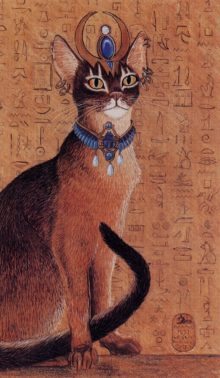 The Ancient Egyptians regarded the cat so highly that they revered it as a deity. The Egyptian Bast, or Pasht, was cat-headed and attended by cats, and consequently every member of the cat family was loved and venerated in ancient Egypt. To kill one was sacrilege. When a household pet died, its owner shaved off his eyebrows as a token of mourning and performed funeral rites for it.
The Ancient Egyptians regarded the cat so highly that they revered it as a deity. The Egyptian Bast, or Pasht, was cat-headed and attended by cats, and consequently every member of the cat family was loved and venerated in ancient Egypt. To kill one was sacrilege. When a household pet died, its owner shaved off his eyebrows as a token of mourning and performed funeral rites for it.
Bast was the cat goddess, and mortal cats whose fur was of three different colors, or who had eyes of different shades were honored in particular for their Bast-like appearance; it is not just the black cat that holds power. Bast is often depicted with a knife in her paw, having beheaded Apophis, the enemy of the Sun.
Egyptian priests believed that cats carried the magnetic forces of nature and so close proximity to the creatures enabled them to access these powers. If a cat died a natural death in the home, the Egyptians would shave their eyebrows as a sign of mourning.
It was in ancient Egypyt that the belief began that a black cat crossing your path brings good luck. The opposite tradition began in the Middle Ages in Europe.
Cats fared badly during the dark times of the Middle Ages because of the association between witches and cats. Black cats were believed to be witches in disguise. An alternative belief was that after seven years of service to a witch, a black cat would turn into a witch. Consequently, a black cat crossing your path was an indication of bad luck, as the devil was watching you.
The cat does not an honorable reputation in the Buddhist tradition either. Because it was absent at the physical death and spiritual liberation of the Buddha, it is viewed with suspicion as a base, earthly creature, lacking respect, which really should have been present at such an auspicious occasion. The only other creature that was not there was the serpent.
The link between the cat and the serpent comes in the Kabbalah, too, and also in Christianity; in pictures where the cat appears at the feet of Christ it carries the same negative imagery as the snake.
In Islam, cats are regarded favorably unless they are black, in which case they are viewed with great suspicion since djinn can transform themselves into black cats. Additionally, the magical powers of the cat are ambivalent, used either for or against man, this refers to the indifference with which a cat treats its prey.
In the Western tradition of cat lore, the animal has nine lives, whereas its Eastern cousin has to manage with only seven.
A Persian belief about the cat echoes the idea of the witch with her familiar. Some people are born with a hemzad, a spirit that accompanies the person throughout his or her life and takes the form of a cat. That its blood is particularly powerful for writing charms further underlines the universally “magical” nature of the cat.
In Africa, too, the clairvoyant powers of the animal are renowned, and so medicine bags made of cat skin are imbued with supernatural powers.
Interestingly, the cat is not in the Chinese Zodiac. One folktale explanation is that heard Buddha saw Cat playing with mice for fun and did not allow that kind of sin into the zodiac.
Another folk story tells that Cat and Rat were the worst swimmers in the animal kingdom. Although they were poor swimmers, they were both quite intelligent. To get to the meeting called by the Jade Emperor, they had to cross a river to reach the meeting place. The Jade Emperor had also decreed that the years on the calendar would be named for each animal as they arrived to the meeting.
Cat and Rat decided that the best and fastest way to cross the river was to hop on the back of Ox. Ox, being naive and good-natured, agreed to carry them both across. Midway across the river, Rat pushed Cat into the water. Then as Ox neared the other side of the river, Rat jumped ahead and reached the shore first. So he claimed first place in the competition and the zodiac.
Borrowed from: Sigils Symbols and Signs
